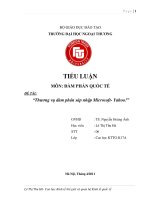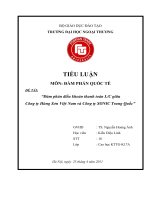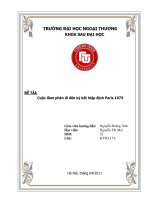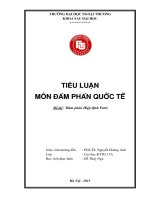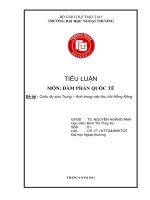slide đàm phán quốc tế ftu session 1 fundamentals of negotiation
Bạn đang xem bản rút gọn của tài liệu. Xem và tải ngay bản đầy đủ của tài liệu tại đây (308.85 KB, 31 trang )
Session 1
Fundamentals of Negotiation
CuuDuongThanCong.com
/>
Everyone Negotiates
• Buying a car, house or other object for which
the price may not be fixed
• Establishing a salary, workplace tasks, office
conditions, etc.
• Organizing team tasks or priorities
• Allocating household tasks
• Deciding how to spend a free evening
CuuDuongThanCong.com
/>
What Makes a Good Negotiator?
Enthusiasm
• Confidence
• Engaged
• Motivated
Recognition
• Accomplishment
Integrity
• No trickery
• Trustworthiness
CuuDuongThanCong.com
Social Skills
• Enjoy people
• Interest in others
Teamwork
• Better as a team
• Self-control
Creativity
• Always looking for ways
to complete the deal
• Versatile/Flexible
/>
Best Negotiators
• Our children are among the best
negotiators because they intuitively
understand that:
– Negotiation is knowing and caring about
what you want!
CuuDuongThanCong.com
/>
Everyone Encounters Conflict
• The question is how does one respond to
conflict?
– What are your options to resolve disputes
(problem-solving/creative solutions)?
– Do you have a strategy?
CuuDuongThanCong.com
/>
Definitions of Conflict
• “Two or more parties believe they have
incompatible objectives” (Kriesberg,1982)
• “Conflict is a belief or understanding that
ones’ own needs, interests, wants or values
are incompatible with someone else’s”
(Bernard Mayer 2000)
CuuDuongThanCong.com
/>
Primary Levels of Conflict within
Organizations
• Intrapersonal (within an individual)
• Interpersonal (between individuals)
• Intragroup (within a group)
• Intergroup (between groups)
CuuDuongThanCong.com
/>
Causes of Conflict
•
•
•
•
Conflict of aims- different goals
Conflict of ideas- different interpretations
Conflict of attitudes - different opinions
Conflict of behavior- different behaviors are
unacceptable
CuuDuongThanCong.com
/>
Stages of Conflict
•
•
•
•
Conflict arises
Positions are stated and hardened
Actions, putting into action their chosen plan
Resolution???
CuuDuongThanCong.com
/>
Views on Conflict
• Traditional view: Conflict should be avoided;
because it is bad.
• Human relations view: Conflict is natural; and,
it is sometimes good and sometimes bad.
• Interactionist view: Conflict is inevitable; and,
it is necessary for healthy development.
CuuDuongThanCong.com
/>
Conflict Resolution Options
• Managing conflict is using it for positive,
constructive outcomes.
• Resolving conflict is getting rid of it.
• Avoiding conflict is doing nothing—at the
moment. Avoiding conflict may be managing
it:
If the conflict is constructive, letting it function may be a
sound strategy.
If the time for intervention is wrong, temporarily avoiding
may be a sound strategy.
CuuDuongThanCong.com
/>
Conflict Resolution Options
• Conciliation: neutral 3rd party assists
disputants by acting as go-between
• Arbitration: neutral 3rd party acts as judge
• Mediation: neutral 3rd party assists parties in
their own negotiations
• Facilitation: neutral 3rd party assists in group
discussions
• Negotiation: parties confer to arrive at
mutually satisfactory solution
CuuDuongThanCong.com
/>
Why Should Negotiation Be a
Core Management Competency?
•
•
•
•
•
Dynamic nature of business
Interdependence
Competition
Information age
Globalization
CuuDuongThanCong.com
/>
Negotiation Styles
•
•
•
•
•
Competition (win-lose)
Collaboration (win-win)
Compromise (split the difference)
Accommodation (lose to win)
Avoidance (lose-lose)
CuuDuongThanCong.com
/>
Competition
•
•
•
•
The goals of the parties are short term.
The parties’ goals are incompatible.
The tangible benefits are the most important.
You expect the other party to be competitive.
CuuDuongThanCong.com
/>
When Competing Is Appropriate
• There is an emergency and you are in a
position to save yourself and others.
• You possess special knowledge or authority.
• There are no other options and you cannot be
hurt by the other party.
CuuDuongThanCong.com
/>
Collaboration
• Developing and maintaining a relationship is
important.
• Both parties are willing to understand the
other party’s needs and objectives.
• Finding a long lasting, creative solution is
required.
CuuDuongThanCong.com
/>
When Collaborating Is Appropriate
ALMOST ALWAYS
CuuDuongThanCong.com
/>
Compromise
• Parties are short of time or resources to get
collaboration.
• A temporary settlement to a complex issue is
needed.
• Issues are not worth the effort of a
collaboration, but relationships are important.
CuuDuongThanCong.com
/>
Accommodation
• The relationship is more important than the
outcome.
• Building goodwill is an important outcome.
• We want the other party to accommodate us
in the future.
CuuDuongThanCong.com
/>
Avoidance
• Neither outcomes of negotiations are
important.
• The costs of the negotiations outweigh the
gains of a deal.
CuuDuongThanCong.com
/>
When Avoiding Is Appropriate
• Tempers are HOT.
• Critical information is lacking.
• There is inadequate time at the moment to
address the matter effectively.
• The matter in dispute is unimportant.
• The relationship is much more important than
the matter in dispute.
CuuDuongThanCong.com
/>
What Style Creates
• Avoiding may sustain positive outcomes but
permits escalating negative outcomes.
• Competing creates a win/lose game.
• Compromising gives up something.
• Collaborating creates win/win.
CuuDuongThanCong.com
/>
What Style and When?
• Two important factors:
The outcome – what you might lose or win
The relationship – how will your relationship
with the players be effected
CuuDuongThanCong.com
/>
High
Accommodating
Collaborative
Lose to win
Win-Win
Compromise
Importance of
RELATIONSHIP
Split the difference
Avoiding
Competitive
Lose-lose
Win at all cost
Win Lose
Low
Low
CuuDuongThanCong.com
Importance of
OUTCOME
High
/>


